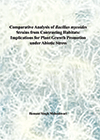PhD defence Hemant Maheshwari

Comparative analysis of Bacillus mycoides strains from contrasting habitats
Implications for plant growth promotion under abiotic stress
This thesis highlights the role of the plant's holobiont, particularly the microbiome within plant tissues, in modulating physiological responses to stress. In the present study, Bacillus mycoides strains isolated from potato endospheres and potato bulk soil were tested for their ability to mitigate the effects of abiotic stresses, including drought, salinity, iron, and heavy metal stress, in Chinese cabbage and Arabidopsis thaliana. We investigated B. mycoides and its colonization behavior in Brassica and legume species. We hypothesized that endophytic strains, which live systemically within host plants, would have a greater plant growth-promoting effect than bulk soil and intermediate strains. The primary question addressed in this thesis is whether endophytic strains are more effective than bulk soil strains in promoting plant growth under abiotic stress conditions. The endophytic strain S3E15 exhibited the highest plant growth promotion and salinity tolerance. Under drought conditions, Bacillus mycoides from bulk soil primarily affected shoots, while endophytes influenced roots. Under iron stress, S3E15 outperformed bulk soil strain SB13.4 in both dicots and monocots with insoluble FeCl₃. In heavy metal stress, bioremediation efficiency depended on both the metal type and the bacterial strain's habitat. We demonstrated that endophytic and bulk soil strains exhibit distinct effects on plant growth under various abiotic stresses. However, the endophytic strain showed greater resilience to abiotic stresses compared to bulk soil strains. Therefore, the study suggested that prioritizing endophytic habitats over bulk soil in the search for beneficial microorganisms could lead to more effective strategies for enhancing plant resilience to abiotic stresses.
